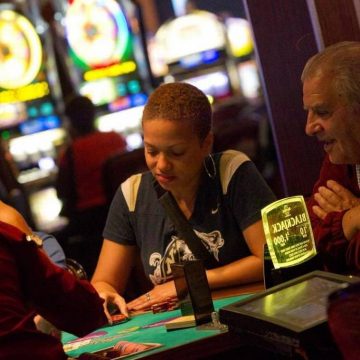
Florida poker rooms once again have the right to offer “designated player games”. The state legislature recently approved designated player games in a move certain to draw a reaction from the Seminole Tribe of Florida, which claims it has a monopoly on banked games.
Banked games have a complicated recent history in Florida. An explanation of banked games and designated player games might be needed.
What Is a Banked Game?
Banked games are those in which the casino or house acts as the banker. This sets up a player versus casino dynamic and most table games in a casino are banked by the house. Under the terms of a 2010 tribal gaming compact between the State of Florida and the Seminole Tribe, the Seminoles have a banked games monopoly in the state.
In 2011, though, certain banked games like Three-Card Poker and Ultimate Texas Hold began appearing in Florida poker rooms, which are licensed nontribal gaming establishments. Private card rooms are allowed to offered “player versus player” casino games like poker, where the house has no stake in the betting. Instead, the casino provides a dealer and other support for the poker hands and receives a percentage of each pot (“the rake”).
What Is a Designated Player Game?
Florida poker rooms skirted the law by allowing gamblers to take the role of banker in 3-Card Poker and Ultimate Texas Hold’em. This banker is called the “designated player”, giving rise to the term designated player games. Essentially, the designated player covers all the bets and the house takes a percentage of the pot, like it would in poker.
The card rooms argued that the player-banked games are thus more like poker, and do not fit under the 2010 tribal gaming compact. By 2014, the State of Florida approved that interpretation of the law. The Seminole Tribe went to court to challenge that interpretation. Its lawyers noted that court in most other US states view designated player games no different than traditional banked games.
Renegotiation of 2010 Tribal Gaming Compact
One reason the state’s leaders took the view they did was the 5-year gaming compact with the Seminoles was coming up for renewal or renegotiation in 2015. Having an outstanding dispute with the Seminoles was a way to give Gov. Rick Scott leverage in negotiating the new gaming compact.
The Seminole Tribe did not see it that way. The 2010 compact said the state had to negotiate compensation if the Seminoles did not retain their monopoly over banked games. If the state unilaterally approved banked games for private interests, the Seminoles had the right to simply withhold their gaming taxes from the state. That amounted to hundreds of millions of dollars of taxes each year.
Seminoles’ 2015 Ultimatum
As the negotiations between Florida’s government and the Seminoles dragged on throughout 2015, tribal leaders set a deadline on when they would stop paying taxes. The two sides went to court to see their interpretation of the law would hold sway, as negotiations continued through the summer and fall of 2015.
In December 2015, Gov. Rick Scott and the Seminoles agreed to a far-ranging new gaming compact. The Seminoles would receive a banked games monopoly for 20 years, while it agreed to pay Florida a minimum of $3 billion in the first 7 years of the compact. Gov. Scott ordered the Florida Division of Pari-Mutuel Wagering to reverse its decision on designated player games, so Florida poker rooms no longer could offer Three-Card Poker and Ultimate Texas Holdem. Designated player games had served their purpose — to get a better deal.
Legislature Refuses to Approve 2015 Gaming Compact
Everything seemed settled, except the state legislature failed to approve Rick Scott’s bargain. The Division of Pari-Mutuel Wagering once again reversed its policy. The Seminoles promptly filed a lawsuit, stating that Florida had breached the 2010 gaming compact. After both sides battled in court for months, U.S. District Judge Robert Hinkle ruled against the State of Florida and the poker rooms in November 2016.
Judge Hinkle noted that the poker rooms’ use of designated player games was “an egregious example of the cardrooms’ attempt to evade the prohibition on banked card games“.
Gaming Compact Negotiations of 2017
All sides hoped for a resolution this spring, as the Florida Senate and Florida House began negotiations on a whole array of statewide gambling laws. The two houses never could agree on policies and those negotiations now have broken down. In response, more Florida cardrooms are offered designated player games again (some, like Magic City Casino in Miami, never stopped). As anyone who’s followed the saga over the past 6 years would expect, the Seminole Tribe is not happy. More court battles are expected to stop the poker rooms, especially given Judge Hinkle’s ruling 8 months ago.
Florida cardrooms’ use of designated player games is spotty. Designated player games allowed for payouts of 30x a player’s bet. South Florida gaming establishments have slot machines, which offer much bigger payouts. Thus, South Florida poker rooms do not feature designated player games as much. Elsewhere in the state, they are a big part of the poker rooms’ gaming revenues.
The poker rooms should expect to be a pawn in a wider game once again. Still, the cardroom owners might not mind, because they can reap the benefits as long as the impasse between the Seminoles and the State of Florida continues — or until a judge orders them to shut down their table games.















